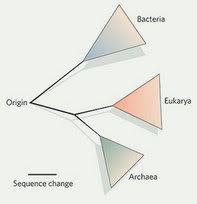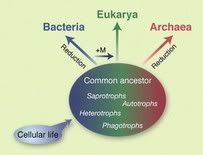 So, archaea are apparently the topic of the week. While I wrote here about the pathogenic potential of some species of these organisms, a new essay in Nature and a new review in Science focus more on their evolution (and the evolution of the other two domains of life) than any health application.
So, archaea are apparently the topic of the week. While I wrote here about the pathogenic potential of some species of these organisms, a new essay in Nature and a new review in Science focus more on their evolution (and the evolution of the other two domains of life) than any health application.
In the essay mentioned, Norman Pace discusses the eukaryote/prokaryote dichotomy. Currently the archaea are classified as prokaryotes since they, like bacteria, lack a true nucleus. However, molecular sequence analysis has shown that the archaea and eukaryotes are actually more closely related to each other than either group is to bacteria (see figure, from Pace's Nature essay). As such, nomenclature that places the bacteria and archaea together into a group is misleading.
Pace mentions that one argument in favor of maintaining the status quo is that "prokaryote" is useful as a characterization for non-eukaryotes. However, he argues that this is a definition using what a prokaryote isn't, instead of what it is. Pace concludes:
I believe it is critical to shake loose from the prokaryote/eukaryote concept. It is outdated, a guesswork solution to an articulation of biological diversity and an incorrect model for the course of evolution. Because it has long been used by all texts of biology, it is hard to stop using the word, prokaryote. But the next time you are inclined to do so, think what you teach your students: a wrong idea.
One problem stems from the etymology of "prokaryote" and "eukaryote." I'm no language scholar so I'm relying on what I've been taught by others (and, of course, good ol' Wikipedia) for the origin of the word: "from Old Greek pro- before + karyon nut or kernel, referring to the cell nucleus". Eukaryote, then, means "true nucleus" (or "good nucleus", according to Wiki). These terms suggest that prokaryotes came before eukaryotes--which indeed, is the generally-accepted scheme.  A second publication in today's Science takes a closer look at the evolution of all of these domains of life, and suggests that some commonly-held views may be a bit backward.
A second publication in today's Science takes a closer look at the evolution of all of these domains of life, and suggests that some commonly-held views may be a bit backward.
It is now generally accepted that some organelles in eukaryotes--specifically, mitochondria and chloroplasts--were originally free-living bacterial species, and that a symbiotic relationship between these bacteria and the primitive eukaryotes (or their ancestors) resulted in their retention and subsequent specialization as organelles. However, the suggestion in the Science review turns this a bit on its head--rather than viewing eukaryotes as kind of a souped-up model loaded with features lacking in their precursors, it suggests that eukaryotes may have actually been the precursors themselves, and that the bacteria and archaea then split from the early eukaryotes (rather than being a product of a bacteria-archaea symbiosis, as some have suggested). While I doubt it will reverse common thinking regarding the evolution of the three domains of life, it's an interesting read, and they draw on a large body of molecular analysis to support their case.
Of course, the news write-ups of this are rather predictable. MSNBC asks, "can evolution make things less complicated?" It's also stated that, assuming this new research is confirmed, it will be "contrary to our cherished notion that evolution makes organisms more complex."
Um, huh? Whose cherished notion?
3 paragraphs later they even note that "if bacteria did take the road toward greater simplicity, they would be in good company. Scientists have identified several cases of genome reduction in organisms..." Indeed, we've seen this in several pathogenic species of bacteria (Mycobacterium leprae, the causative agent of leprosy, for one). Additionally, in the same issue of Science that the Kurland review was published is a study showing some benefits to E. coli due to selective elimination of parts of the genome:
Genome reduction also led to unanticipated beneficial properties: high electroporation efficiency and accurate propagation of recombinant genes and plasmids that were unstable in other strains.
So if "complexity" is defined as genome size, certainly there are many examples of where it has decreased over time, or where a huge genome doesn't necessarily represent what most people consider a "complex" organism (or at least, one that's less "complex" than humans, if you follow the "evolution as an increase in complexity to the ultimate organism, man" line of reasoning). I think these types of thought are more important to get right in our students than worrying so much about what to call the main groups of organisms (though "the organisms formerly known as prokaryotes" has a nice ring to it--perhaps we can just start referring to them with a symbol).
References
Pace, NR. 2006. Time for a change. Nature 441:289.
Kurland, GC et al. 2006. Genomics and the irreducible nature of eukaryote cells. Science 312:1011 - 1014.
Images from http://www.nature.com/nature/journal/v441/n7091/images/441289a-i1.0.jpg and http://www.sciencemag.org/cgi/content/full/312/5776/1011/FIG1
- Log in to post comments

Good good good! I am teaching this on Monday - and it is nice to be up to date on current thinking.
I thought angiosperms were the topic of the week. Any thoughts about Amborella being a living fossil (Nature)?
And by the way, I had trouble with Typekey (said your e-mail authenticator wasn't working, and to INFORM You).
I don't think it's wrong to speak of prokaryotes and eukaryotes -- or of reptiles as distinct from birds and mammals. There are fundamental qualitative differences between the groups. I do not think it is helpful to purge our thinking of paraphyletic groups. Not all changes in DNA are created equal!
Maybe the term akaryotes would be better? And yes, bacteria are advanced organsisms, devoid of introns and all... ;-)
/Dr. A.
Including bacteria and archaea under the term "prokaryotes" still makes sense. Sometime about 1 to 1.5 BYA there existed the three major groups we now recognize: the primitive eukaryote, the bacteria and the archaea. Today the modern eukaryote is an amalgam of those three groups. Of this there is no doubt. Your aguement comes down to the issue of how many genes that make up the modern eukaryote were derived from the archaea or the bacteria. I have looked at this question. The answer is not simple.
To provide a very simple summary: there existed back about 1.5 BYA two major clades of "prokaryotes". They both contributed a massive number of genes to a third clade that co-existed with them at that time. That was the primitive eukaryote.
This is not really a big problem; especially once we accept that horizontal gene transfer has been (and probably is) a major factor in the evolution of life.
Is this issue likely to fuel the ID crowd? My reading of it on MSNBC made it sound like it would have to involve a "reverse" evolutionary scenario where the more complex eukaryote "devolved" into the less complex archaea.
Sadly for those desparate for a difference, bacteria have introns too. They are even self splicing!
Structure and Activities of Group II Introns
So much for the "superiority of eukaryotes" :)
That´s right Paul, my point was rather that the introns are ancestral and have not evolved in eukaryotes. Raher, bacteria have (largely) lost them throughout evolution.
Just for fun, here´s another bacterial intron: http://tinyurl.com/na8ys
So if "complexity" is defined as genome size, certainly there are many examples of where it has decreased over time, or where a huge genome doesn't necessarily represent what most people consider a "complex" organism (or at least, one that's less "complex" than humans, if you follow the "evolution as an increase in complexity to the ultimate organism, man" line of reasoning).
Large genomes are probably deleterious. They are the product of relaxed selection due to small population size. That means that large genomes are a product of devolution (in the popular science use of the term) not the other way around.
I don't think it's wrong to speak of prokaryotes and eukaryotes -- or of reptiles as distinct from birds and mammals. There are fundamental qualitative differences between the groups. I do not think it is helpful to purge our thinking of paraphyletic groups.
Cladist in the house, right here. There is not reason to pray to paraphyletic classifications. In my opinion, you must always begin with monophyletic clades. From there (and only there), can you determine how traits evolve. Cladist, out.
What's wrong with defining a group by what it's not? Yes, putting bacteria and archaea in the same category fails to reflect their evolutionary lineage -- but is there any particular reason why our descriptive terminology needs to reflect that?
The two groups share an important trait -- the absence of a true nucleus. Distinguishing between nucleated and non-nucleated cellular life would seem like an entirely reasonable thing to do.
I think the Science article suggests that there was still an engulfment of a eubacteria by a proto-eukaryote, but that it was not an engulfment of eubacteria by an archaebacterium. Meaning that the a more complex ancestor engulfed a more derived one leading to eukaryotes, but that the cell that did the engulfing had a lot of more complex features as opposed to just putting an archaeon and eubacterium together and evolving from there.
I love this line from the Science paper:
The image of a bird of prey swooping down over a primordeal pool, and then rising majestically clutching a writhing bacillus in its claws, to be taken back to its nest to feed its young, has a certain appeal to it.
Bob
I'd place my bets on the Hartman-Fedorov chronocyte hypothesis, presented in The origin of the eukaryotic cell: A genomic investigation. They propose that the ancestral eukaryote host was a RNA-protein organism with several of what they call Eukaryote Signature Proteins (eukaryote-only one).
The first emdosymbiont was an archaeon; it absorbed its host's genome, reverse-transcribing it into DNA. But the host's RNA processing remained.
This early eukaryotes also absorbed many genes from various (eu)bacterial sources, including those still-recognizable endosymbionts, mitochondria and chloroplasts.
For an attempt to find the times of some of the events in early eukaryotic evolution, see A genomic timescale for the origin of eukaryotes.
Woese and Pace have been pushing this angle for almost a couple decades now...
I agree with Mike Syvanen's comments. Furthermore, there is yet to be found a eukaryote that doesn't retain the possible remnants of early horizontal transfer from the mitochondrion.
At some point, it becomes necessary to bail on a word simply because it has been abused for too long. I agree that if it were used carefully, prokaryote is a fine term. But since many if not most people when they use it still think of all prokaryotes as being a single group and since that does not appear to be correct, we should try and discourage the use of the term. In a new Evolution textbook I (and some others) have coming out we decided to avoid the use of the term as much as possible. Anyway, most of the time when people talk about "prokaryotes" they mean either bacteria or archaea so they shuold just be specific.
thanks..